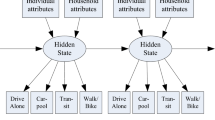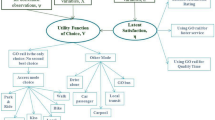Abstract
This paper proposes a conceptual framework to model the travel mode searching and switching dynamics. The proposed approach is structurally different from existing mode choice models in the way that a non-homogeneous hidden Markov model (HMM) has been constructed and estimated to model the dynamic mode srching process. In the proposed model, each hidden state represents the latent modal preference of each traveler. The empirical application suggests that the states can be interpreted as car loving and carpool/transit loving, respectively. At each time period, transitions between the states are functions of time-varying covariates such as travel time and travel cost of the habitual modes. The level-of-service (LOS) changes are believed to have an enduring impact by shifting travelers to a different state. While longitudinal data is not readily available, the paper develops an easy-to-implement memory-recall survey to collect required process data for the empirical estimation. Bayesian estimation and Markov chain Monte Carlo method have been applied to implement full Bayesian inference. As demonstrated in the paper, the estimated HMM is reasonably sensitive to mode-specific LOS changes and can capture individual and system dynamics. Once applied with travel demand and/or traffic simulation models, the proposed model can describe time-dependent multimodal behavior responses to various planning/policy stimuli.





Similar content being viewed by others
References
Aarts, H., Verplanken, B., Van Knippenberg, A.: Habit and information use in travel mode choices. Acta Psychol. 96(1), 1–14 (1997)
Amador, F.J., Gonzalez, R.M., Ortuzar, J.: Preference heterogeneity and willingness to pay for travel time savings. Transportation 32, 627–647 (2005)
Banister, D.: The influence of habit formation on modal choice: a heuristic model. Transportation 7(1), 5–33 (1978)
Beige, S., Axhausen, K.: Interdependencies between turning points in life and long-term mobility decisions. Transportation 39, 857–872 (2012)
Ben-Akiva, M.: Planning and action in a model of choice. In: Hess, S., Daly, A. (eds.), Choice Modelling: The State-of-the-art and the State-of-Practice, pp. 19–34. Emerald, Bingley (2010)
Bhat, C.: Incorporating observed and unobserved heterogeneity in urban work travel mode choice modeling. Transp. Sci. 34(2), 228–238 (2000)
Brownstone, D., Ghosh, A., Golob, T., Kazimi, C., Van Amelsfort, D.: Drivers’ willingness-to-pay to reduce travel time: evidence from the San Diego I-15 congestion pricing project. Transp. Res. Part A 37, 373–387 (2003)
Cervero, R., Day, J.: Suburbanization and transit-oriented development in China. Transp. Policy 15, 315–323 (2008)
Cherchi, E., Manca, F.: Accounting for inertia in modal choices: some new evidence using a RP/SP dataset. Transportation 38, 679–695 (2011)
Choudhury, C.F., Ben-Akiva, M., Abou-Zeid, M.: Dynamic latent plan models. J. Choice Model. 3(2), 50–70 (2010)
Cirillo, C., Axhausen, K.: Dynamic model of activity-type choice and scheduling. Transportation 37, 15–38 (2010)
Cirillo, C., Xu, R.: Dynamic discrete choice models for transportation. Transp. Rev. 31(4), 473–494 (2011)
Daziano, R.A., Wang, C.: Convergence analysis of Markov chain Monte Carlo estimators of a transportation mode choice model. In: Transportation Research Board 92nd Annual Meeting (No. 13-3233) (2013)
Eliasson, J.: Lessons from the Stockholm congestion charging trial. Transp. Policy 15(6), 394–404 (2008)
Gaker, D., Walker, J.: Insights on car-use behaviors from behavioral economics. In: Lucas, K., Blumenberg, E., Weinberger, R. (eds.) Auto Motives: Understanding Car Use Behaviors. Bingley, Emerald (2011)
Gärling, T., Axhausen, K.W.: Introduction: habitual travel choice. Transportation 30(1), 1–11 (2003)
Gelman, A., Rubin, D.B.: Inference from iterative simulation using multiple sequences. Stat. Sci. 7, 457–511 (1992)
Gill, J.: Bayesian Methods: A Social and Behavioral Science Approach. CRC Press, Boca Raton (2002)
Goodwin, P.B.: Habit and hysteresis in mode choice. Urban Stud. 14(1), 95–98 (1977)
Goulias, K.G.: Longitudinal analysis of activity and travel pattern dynamics using generalized mixed Markov latent class models. Transp. Res. Part B 33(1999), 535–557 (1999)
Habib, K., Tian, Y., Zaman, H.: Modelling commuting mode choice with explicit consideration of carpool in the choice set formation. Transportation 38, 587–604 (2011)
Hollingworth, B., Miller, E.: Retrospective interviewing and its application in study of residential mobility. Transp. Res. Record. J. Transp. Res. Board 1551, 74–81 (1996)
Kitamura, R.: Panel analysis in transportation planning: an overview. Transp. Res. Part A 24(6), 401–415 (1990)
Koppelman, F.: Predicting transit ridership in response to transit service changes. J. Transp. Eng. 109, 548–564 (1983)
Lanzendorf, M. (2003). Mobility biographies: a new perspective for understanding travel behavior. Paper presented at the 10th international conference on travel behavior research, Lucerne, August, 2003
Lanzendorf, M. (2004). Key events and their effect on mobility biographies: the case of child birth. Paper presented at the 11th International Conference on Travel Behavior Research. MacDonald, I.L. and Zucchini, W. (1997). Hidden Markov and Other Modelers for Discrete-Valued Time Series. Chapman and Hall
MacDonald, I.L., Zucchini, W.: Hidden Markov and Other Modelers for Discrete-Valued Time Series. Chapman and Hall, London (1997)
McFadden, D., Train, K.: Mixed MNL models for discrete response. J. Appl. Econ. 15, 447–470 (2000)
Netzer, O., Lattin, J., Srinivasan, V.: A hidden Markov model of customer relationship dynamics. Mark. Sci. 27(2), 185–204 (2008)
Ortuzar, J., Willumsen, L.: Modelling Transport. Wiley, Chichester (2001)
Outwater, M., Spitz, G., Lobb, J., Campbell, M., Sana, B., Pendyala, R., Woodford, W.: Characteristics of premium transit services that affect mode choice. Transportation 38(4), 605–623 (2011)
Pas, E., Koppelman, F.: An examination of the determinants of day-to-day variability in individuals’ urban travel behavior. Transportation 14(1), 3–20 (1987)
Paulssen, M., Temme, D., Vij, A., Walker, J.: Values, attitudes, and travel behavior: a hierarchical latent variable mixed logit model of travel mode choice. Transportation 41, 873–888 (2014)
Pendyala, R.M.: Challenges and opportunities in advancing activity-based approaches for travel demand analysis. In: Kitamura, R., Yoshii, T., Yamamoto, T. (eds.) The Expanding Sphere of Travel Behaviour Research Selected Papers from the 11th International Conference on Travel Behaviour Research. Emerald Group Publishing Limited, Bingley (2009)
Pendyala, R.M., Kitamura, R., Kikuchi, A.: FAMOS: The Florida acitivity mobility simulator. Presented at the Conference on “Progress in Activity-Based Analysis”. Vaeshartelt Castle, Maastricht, The Netherlands, May 28-31 (2004)
Pendyala, R.M., Pas, E.I.: Multiday and multiperiod data. Presented at Transport Surveys: Raising the Standard. Grainau, Germany, 24–30 (1997)
Peters, H.E.: Retrospective versus panel data in analyzing lifecycle events. J. Hum. Resour. 23, 488–513 (1988)
Ramadurai, G., Srinivasan, K.: Dynamics and variability in within-day mode choice decisions: role of state dependence, habit persistence, and unobserved heterogeneity. Transp. Res. Rec. 1977, 43–52 (2006)
Redmond, L., Mokhtarian, P.: The positive utility of the commute: modeling ideal commute time and relative desired commute amount. Transportation 28, 179–205 (2001)
Rossi, P.E., Allenby, G.M.: Bayesian statistics and marketing. Mark. Sci. 22(3), 304–328 (2003)
Scott, J., Alwin, D.: Retrospective versus prospective measurement of life histories in longitudinal research. In: Giele, J.Z., Elder, G.H., Jr. (eds.) Methods of Life Course Research: Qualitative and Quantitative Approaches, pp. 98–127. Sage, Thousand Oaks (1998)
Scott, L.S.: Bayesian methods for hidden Markov models, recursive computing in the 21st century. J. Am. Stat. Assoc. 97(475), 337–351 (2002)
Smith, T., Vounatsou, P.: Estimation of infection and recovery rates for highly polymorphic parasites when detectability is imperfect, using hidden Markov models. Stat. Med. 22, 1709–1724 (2003)
Srinivasan, K., Bhargavi, P.: Long-term changes in mode choice decisions in Chennai: a comparison between cross-sectional and dynamic models. Transportation 34, 355–374 (2007)
Tang, L., Xiong, C., Zhang, L.: Artificial intelligence approach to modeling travel mode switching in a dynamic behavioral process. Transp. Plan. Technol. (in press) (2015)
Vij, A.: Incorporating the influence of latent modal preferences in travel demand models. PhD dissertation, University of California, Berkeley (2013)
Vij, A., Carrel, A., Walker, J.: Incorporating the influence of latent modal preferences on travel mode choice behavior. Transp. Res. Part A 54, 164–178 (2013)
Walker, J., Ben-Akiva, M.: Generalized random utility model. Math. Soc. Sci. 43, 303–343 (2002)
Wang, T., Chen, C.: Attitudes, mode switching behavior, and the built environment: a longitudinal study in the Puget Sound Region. Transp. Res. Part A 46(10), 1594–1607 (2012)
Wahba, M., Shalaby, A.: Learning-based framework for transit assignment modeling under information provision. Transportation 41(2), 397–417 (2014)
Wen, C., Koppelman, F.: The generalized nested logit model. Transp. Res. Part B 35(7), 627–641 (2001)
Xiong, C., Zhang, L.: A Positive model of departure time choice under road pricing and uncertainty. Transp. Res. Rec. 2345, 117–125 (2013a)
Xiong, C., Zhang, L.: A descriptive Bayesian approach to modeling and calibrating en-route diversion behavior. IEEE Trans. Intell. Transp. Syst. 14(4), 1817–1824 (2013b)
Xiong, C., Chen, X.M., He, X., Guo, W., Zhang, L.: The analysis of dynamic travel mode choice: a heterogeneous hidden Markov approach. Transportation (2015a) (Accepted)
Xiong, C., Chen, X., He, X., Lin, X., Zhang, L.: Agent-based en-route diversion simulation: dynamic behavioral responses and network performance represented by macroscopic fundamental diagram. Transp. Res. Part C (in press) (2015b)
Xiong, C., Yang, D., Chen, X.M., Zhang, L.: On Model Transferability: A Bayesian Approach to Recalibrating Dynamic Travel Demand Models. Presentation at the International Association of Transportation Behavior Research, July 17–21, 2015, London (2015c)
Acknowledgments
This research is financially supported by National Science Foundation CAREER Award Project “Reliability as an Emergent Property of Transportation Networks” and U.S. Federal Highway Administration Exploratory Advanced Research Program. The authors would like to thank Chen Dong for providing advices in addressing various hidden Markov model estimation issues. The authors would also like to thank the three anonymous reviewers for their invaluable comments and suggestions for the authors to improve this paper’s quality. The authors are solely responsible for all statements in this paper.
Author information
Authors and Affiliations
Corresponding author
Rights and permissions
About this article
Cite this article
Xiong, C., Zhang, L. Dynamic travel mode searching and switching analysis considering hidden model preference and behavioral decision processes. Transportation 44, 511–532 (2017). https://doi.org/10.1007/s11116-015-9665-3
Published:
Issue Date:
DOI: https://doi.org/10.1007/s11116-015-9665-3




